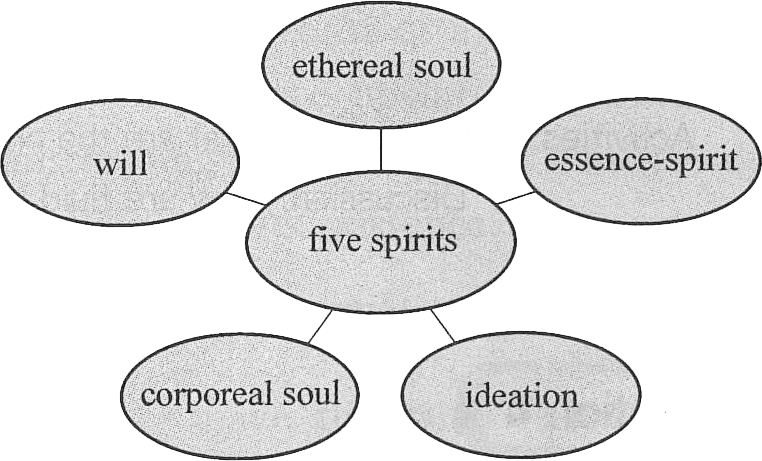
Fig. 3-2 Five spirits
Text
Body fluids are general terms for all kinds of normal fluids in the body, except blood, also known as fluids and humor. Fluid refers to the liquid substance that circulates with qi and blood, also known as thin fluid. Humor is the thick fluid stored in body cavities such as bowels, viscera, articular and cranial cavities for nourishing and lubricating them, also known as thick fluid. Spirit refers to all human life activities including mind, will, mood and thinking, governed by the heart.
Like qi and blood, body fluids are also substances that make up the body and maintain life activities.
After water and food enter the stomach, digestion begins, and nutrients including fluids are partially absorbed. Then the stomach sends the partially digested food down into the small intestine where the essence and water are further absorbed. Finally, the food waste together with some water is sent to the large intestine where the water is continuously absorbed into the body and stool is formed.
The distribution of fluid and humor is achieved mainly through the joint functions of the spleen, lungs, kidneys, liver and triple energizers*.
The spleen qi disperses essence* because the spleen has the function of transportation and transformation of food and its essence, and upbearing the clear. It can send fluid up to the lungs which then distribute the fluid throughout the body. On the other hand, the spleen can directly distribute and disperse fluid and nutrients to the whole body. The lungs regulate the waterways* because the lungs are the upper water source and have the functions of diffusing and downbearing fluid. The lungs diffuse body fluids outward and upward to the head and skin to nourish and moisten them, and to discharge the water in the form of sweat. The lungs send body fluids down to the viscera and bowels to nourish and moisten them, and then send the fluid to the kidneys to be discharged. The kidneys dominate water*, because first, kidney qi has the function of promoting and regulating water metabolism; second, turbid fluid formed during metabolism in all body organs is sent down to the kidneys, then the kidneys separate the turbid fluid into clear fluid and turbid fluid. The clear fluid is evaporated by the kidneys up to the lungs which in turn distribute the clear fluid to the entire body. The turbid fluid, acted by the transformation function of the kidney qi, flows into the bladder to be discharged out of the body.* The kidneys regulate and control how much clear fluid is to be evaporated up to the lungs and how much is sent down to the bladder, so as to keep body fluids and humor in proper amounts. The liver dominates free coursing* of qi, which provides power for all activities of the viscera. And the triple energizers dominate water passage* because triple energizers are the passages of the circulation of body fluids.
Body fluid discharge is achieved through the comprehensive functions of the lungs, kidneys, large intestine and bladder, in the way of sweating, respiration, urination and defecation*.
The kidneys dominate urination and defecation* as the urine is formed mainly through the evaporating and separating function of the kidneys, and kidney qi governs* urination and defecation. The lungs govern sweat discharge and respiration* and therefore, are associated with body fluid discharge.
The main physiological functions of body fluids are to nourish the whole body, to be transformed into blood, to regulate yin and yang, and to discharge waste products.
Spirit and body together form the human being. Spirit controls the body. Without spirit, a person is just a dead body and, without body, there is no material basis for the spirit to manifest itself. Therefore, spirit and body are interrelated, and they are two sides of the same coin.
Spirit is transformed from essence, qi, blood and body fluids, and it is formed through the response of the viscera to the external environment. Thus, all viscera are involved in the formation of spirit.

Fig. 3-2 Five spirits
All in all, spirit is subdivided into ethereal soul*, essence-spirit*, ideation*, corporeal soul*, and will* as listed in Fig. 3-2. Ethereal soul is the moral and spiritual part of the human being and is dominated by the liver. Essence-spirit is the state of mind or mood, reflecting the strength of essence and is controlled by the heart. Ideation is the act or power of thinking and forming ideas and is dominated by the spleen. Corporeal soul is the animating part of one's mind and is governed by the lungs. Will refers to mental power by which a person can direct thoughts and actions and is governed by the kidneys.